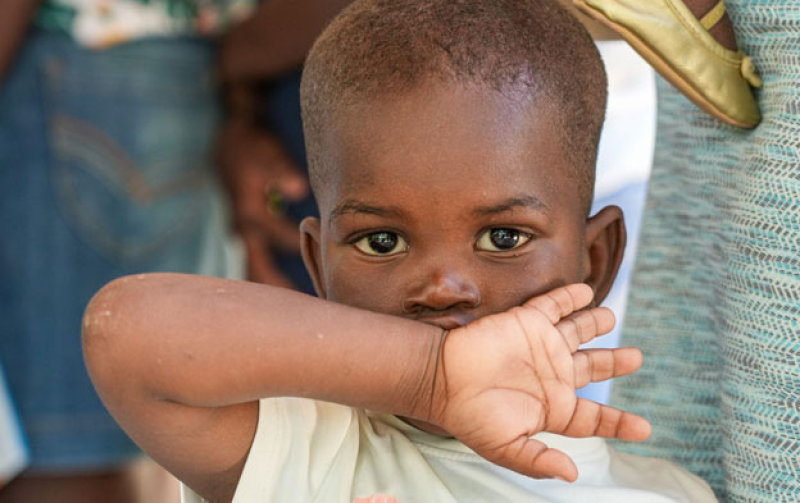- United States and Bangladesh Launch Money Laundering Bench Book |
- 6 BD peacekeepers killed, 8 hurt in attack on Sudan UN Base |
- Burglary at Hadi’s village home in Jhalokathi |
- Martyred Intellectuals Day on Sunday |
- Campaign from Jan to rein in overuse of antibiotics: Adviser |
UNICEF Urges Global Action to Save Displaced Kids in Haiti

A child gazes to the camera as he waits for his turn at a UNICEF-supported mobile clinic in Boucan Carré, Haiti.
New figures from the United Nations Children’s Fund (UNICEF) show that displacement has surged significantly in Haiti, worsening the country’s already dire security and humanitarian crises. Nearly 90 percent of the capital is now controlled by armed gangs.
“Children in Haiti are experiencing violence and displacement on a terrifying scale,” said Catherine Russell, UNICEF Executive Director. “Each time they are forced to flee, they lose not only their homes but also their chance to go to school — and simply to be children.”
More than 1.3 million people have been displaced by rising insecurity, including over 680,000 children — twice as many as last year — who have been forced from their homes by violence. The report notes that the scale of displacement in 2025 has reached “unprecedented” levels, with the number of displacement sites soaring to 246 nationwide. Thousands of children have been displaced multiple times as gang violence intensifies.
UNICEF’s latest Child Alert report highlights the fragile state of displacement shelters in Haiti, where roughly one-third lack basic protective infrastructure. Women and children bear the brunt of this crisis, facing disproportionate levels of violence, exploitation, and abuse. The UN reports that violations of children’s rights are a daily occurrence, especially in areas controlled by armed groups.
An estimated 2.7 million people — including 1.6 million women and children — live under gang control. Security in most displacement shelters is dire, with gender-based violence widespread and fear pervasive among children and adolescents.
“More children are being subjected to trafficking, exploitation, and forced recruitment by gangs,” said Volker Türk, UN High Commissioner for Human Rights. “We can only imagine the long-term impact for the children of Haiti — and for society as a whole.”
With most schools being used as displacement shelters, education in Haiti has been severely disrupted, affecting roughly half a million students. Over 1,600 schools were closed, and dozens were occupied by armed groups during the 2024–2025 school year. The education sector is also struggling with acute shortages of textbooks, learning materials, and qualified teachers.
“Nearly 1,600 schools have been attacked, occupied, or closed as a result of unrelenting violence, leaving more than one in four children out of the classroom,” said Giacomo Colarullo, UNICEF Emergencies Communications Officer. “School is not only a place to learn, but a safe haven. When that disappears, we risk losing an entire generation.”
UNICEF estimates that more than 3.3 million children in Haiti are in urgent need of humanitarian assistance, with over one million facing severe food insecurity. This year alone, some 288,500 children under the age of five are projected to suffer from acute malnutrition. The worsening hunger crisis is largely driven by soaring food prices, which have made basic items unaffordable for most families, forcing many to skip meals or rely on nutrient-poor diets.
Additionally, widespread insecurity along border crossings and key routes has severely restricted the delivery of humanitarian aid, cutting off access to nutrition, healthcare, and protection services. Aid workers continue to face high risks of violence while performing their duties.
“Hunger is worsening at an alarming speed,” Colarullo said. “Less than half of health facilities in the metropolitan area of Port-au-Prince remain fully functional, leaving children unable to access the care they need to survive. UNICEF and partners continue to deliver therapeutic food, mobile clinics, and support for displaced families, but access and funding remain major obstacles.”
Conditions for children have been further worsened by recent foreign aid cuts and severe funding shortages for lifesaving humanitarian programmes, including those of the World Food Programme (WFP), on which Haiti has long depended for food security. Since January 2022, WFP has reached more than two million people in Haiti and worked with the government to provide school meals to thousands of children.
WFP estimates that it needs at least USD 139 million to sustain aid operations for Haiti’s most vulnerable populations over the next 12 months. However, funding cuts have forced the agency to suspend hot meal distributions and halve food rations for displaced families. For the first time, WFP has also been unable to pre-position food supplies for climate-related disasters during the Atlantic hurricane season due to a lack of resources.
“Today, more than half of all Haitians don’t have enough to eat,” said Wanja Kaaria, WFP Director in Haiti. “With our current funding levels, WFP and partners are struggling to keep starvation at bay for thousands of the most vulnerable — children, mothers, and families who are running out of options and hope.”
Despite access challenges, UNICEF and its partners have made vital progress in addressing the vast scale of needs. So far, the agency has treated over 86,000 children suffering from malnutrition and provided healthcare services to more than 117,000 people. Additionally, UNICEF has supplied safe water to 140,000 people.
UNICEF is urgently appealing for greater international support to expand lifesaving assistance and protection for displaced children — ensuring safe shelter, family reunification, psychosocial care, and access to essential health, nutrition, education, and sanitation services. However, the organisation’s Humanitarian Action for Children appeal for Haiti remains critically underfunded, threatening to halt these efforts.
“The children of Haiti cannot wait,” Russell warned. “Like every child, they deserve a chance to be safe, healthy, and to live in peace. It is up to us to take action for Haiti’s children now.”

